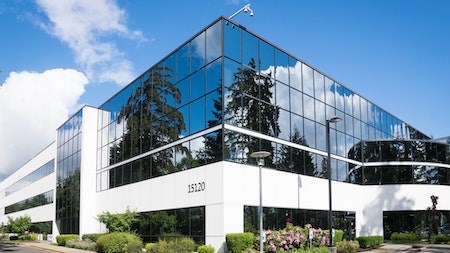Owning your office space provides equity, and you control how the property is managed. However, you must be prepared to commit substantial capital upfront and are responsible for all maintenance and repairs.
As with any type of property purchase, location is an important consideration. If you can’t find suitable space available to buy, you may have to commit to renting, or vice versa. However, depending on local market conditions, some landlords may be willing to remodel existing properties to suit your needs.
Cost is also important, and if you are choosing between two equally attractive properties, it’s essential to do short and long term cost comparisons.
Pros and cons of ownership
Pros
• You build equity, which can be used as security against loans.
• You control what happens on your property.
• You can alter the building as you like, within local regulations and bylaws.
• You can rent out extra space for additional revenue.
• Your mortgage payments will remain fairly stable.
• Interest payments on mortgages are tax-deductible.
• You can claim building depreciation for tax purposes.
• When you retire, you can sell or let the property for retirement capital or additional income.
Cons
• There are substantial initial expenditures, such as broker and conveyancing fees, and banks require far larger deposits than for residential property.
• The money you invest in the property could be used to grow your business in other ways. You need to determine if your cash flow will be adversely affected.
• You are responsible for renovations, repairs and maintenance as well as rates and taxes.
• If you outgrow the space, you may need to sell the property when the market is unfavourable.
Questions to ask
How long can you commit to a location or a building?
If the answer is ‘a short term’, then renting is usually more cost-effective than buying. However, if you are considering a property where you can make your headquarters for a decade or more, then buying becomes more financially attractive.
How fast is your business growing?
If your business is booming and you expect rapid growth in the next few years, you may outgrow the building or buy more space than you need at present, with all the associated expenses.
If you outgrow the new facilities, it will be easier to move if you are renting. The same applies if you think your business may shrink in the next few years.
How is the local economy doing?
If the area in which you want to buy is coming out of a slump this could be a good time to invest. However, if property values are declining or are overinflated, you might be able to rent space in a better location and prevent the loss of capital that would result from buying and perhaps needing to sell in a slow market.
Pros and cons of renting
The main advantages to renting include low initial financial outlay, flexibility and ease of maintenance. However, you sacrifice equity and control over your facility.
Pros
• Low initial financial commitment.
• Rent payments are tax-deductible.
• The landlord is responsible for repairs and maintenance.
• Some landlords will remodel to suit tenants’ requirements.
• You can generally afford to rent in a better area than you could buy.
• Higher cash flow helps your credit rating and your business.
• The landlord may cover utility costs such as waste management or water.
• It’s easier to move if you outgrow the space or want to downsize.
Cons
• Rent usually increases when a lease is renewed.
• You are at the mercy of the landlord when it comes to repairs, which could be frustrating.
• The landlord may have rules concerning the use and condition of outside areas that may affect storage of vehicles and materials.
• Even if your present landlord is good, that could change in the future.
Conclusion
If equity and more control over your workplace are important, owning your office space makes good business sense. Renting is usually the better option if your priorities are flexibility and cash flow over equity.





